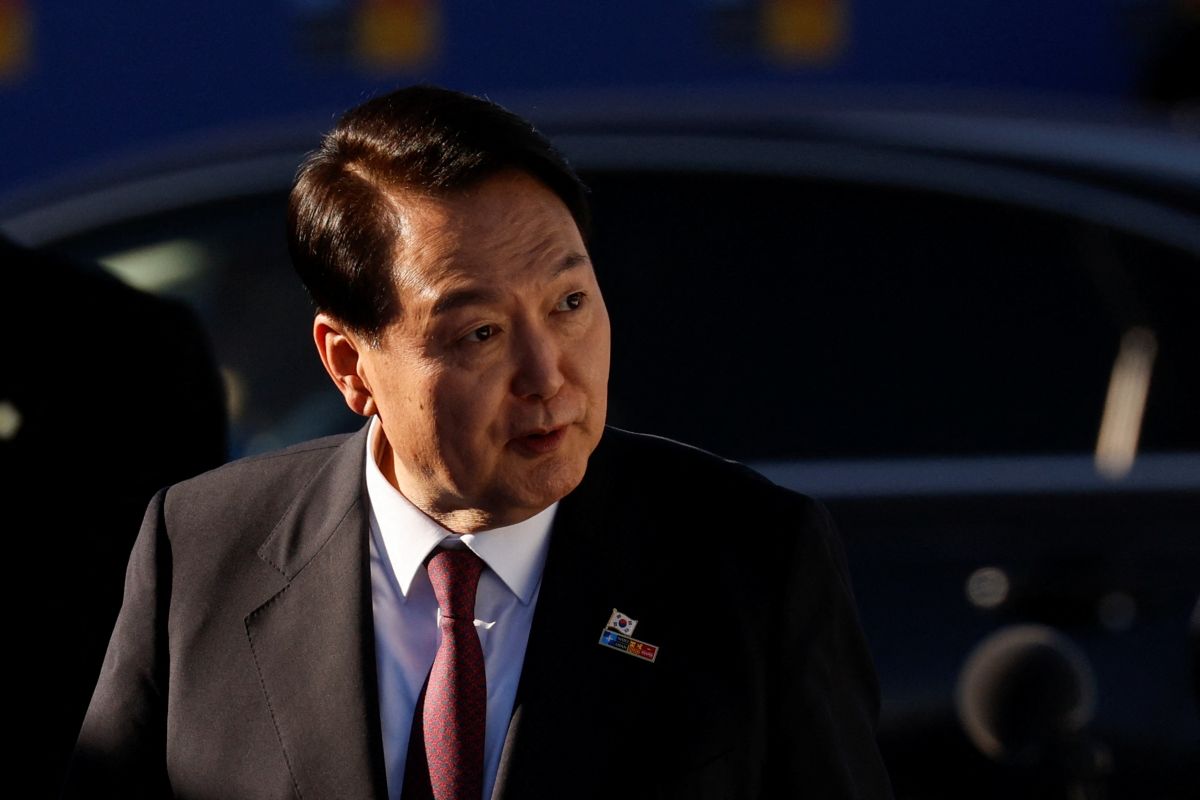EU-South Korea Extend Cooperation Beyond the Economy
The 10th EU-Republic of Korea Summit, held on 22 May in Seoul, reaffirmed the importance of South Korea as a critical Asian partner of the Union. The meeting also signalled the growing importance of security issues in bilateral relations. South Korea shares the EU’s assessment of Russian aggression against Ukraine and intends to continue to support the invaded country, but not with supplies of military equipment for now. The announcement of a “green” partnership indicates both sides’ willingness to engage in other areas of cooperation, which also will benefit the development of Polish-South Korean relations.
.jpg) POOL / Reuters / Forum
POOL / Reuters / Forum
EU cooperation with South Korea dates back to 1963 when the Republic of Korea and the European Economic Community established diplomatic relations. EU-South Korea relations strengthened with the establishment of a strategic partnership in 2010 and the entry into force of agreements on political, economic, and security issues in the following years. A free trade agreement (FTA) came into effect in 2011, while a framework agreement establishing the scope of political and economic cooperation launched in 2014, and a Crisis Management Participation Agreement came to fruition in 2016.
Since 2002, there has been a mechanism for EU-South Korea summits involving the presidents of the European Council, the European Commission, and the Republic of Korea. The 10th summit in Seoul, which coincided with the 60th anniversary of EU-South Korea relations this year, was the first meeting between European Council President Charles Michel and European Commission President Ursula von der Leyen and President Yoon Suk-yeol of South Korea. In a joint statement, the leaders emphasised cooperation on peace and security as well as on the economy and sustainable development.
Peace and Security
The leaders agreed to make security issues the subject of regular talks between the EU and South Korea. To this end, they set up a strategic dialogue in which the EU’s High Representative for Foreign Affairs and Security Policy and the South Korean foreign minister are to participate. Russian aggression against Ukraine and the development of North Korea’s nuclear and missile potential received the most attention. Both were identified as threats to global peace and security.
The EU and South Korea condemned Russia’s aggression and crimes and agreed to exert further economic and political pressure on Russia. Despite declaring additional support for Ukraine, including security areas, the statement did not mention South Korean military assistance. This was in line with the official position of the South Korean authorities who denied reports that they were to transfer artillery munitions to Ukraine through the U.S. or other countries. South Korea is stepping up humanitarian support to Ukraine, pledging $130 million worth of aid in May this year, including de-mining equipment.
Both sides also addressed the issue critical from a South Korean perspective of North Korea. The EU and South Korea condemned the development of the North’s nuclear and missile programmes and human rights violations. They also called on all states, particularly the permanent members of the UN Security Council, to implement the sanctions imposed on North Korea.
The EU and South Korea share in common the interest to shape a free, open, and rules-based Indo-Pacific region. Emphasising the importance of multilateralism, the partners stressed the need for dialogue with ASEAN, among others. They advocated ensuring freedom of navigation and overflight, including in the South China Sea, and maintaining peace and stability in the Taiwan Strait, expressing opposition to unilateral actions to change the status quo. However, they did not mention China as a source of these threats, reflecting the non-confrontational nature of the EU and South Korea’s Indo-Pacific strategies.
Both sides also identified other areas of cooperation, including the implementation of non-proliferation regimes (e.g., the Non-Proliferation Treaty), combating cyberthreats, countering disinformation, and maintaining maritime security. Building on the experience of collaboration in Operation Atalanta against pirates off the African coast and the EU’s Coordinated Maritime Presence (CMP) mechanism, the EU and South Korea are considering further cooperation in the maritime domain.
Economy and Sustainable Development
South Korea and the EU intend to develop trade and investment cooperation, a pillar of their relationship. In 2022, trade in goods amounted to €132 billion. The EU was South Korea’s third-largest trading partner while South Korea was the EU’s ninth-largest for trade. The goal of increasing EU agri-food exports could come from further facilitating market access to South Korea after it recognised EU regionalisation measures to prevent the spread of African swine fever and avian influenza last September. EU companies (notably those from the Netherlands, Germany, and France) remain the largest foreign investors in South Korea, with cumulative South Korean investment in the EU in 2022 amounting to €36 billion (mostly in the Netherlands, followed by Hungary, Poland, Czechia, and Slovakia).
At the summit, South Korea and the EU established a “Green Partnership” to respond to climate change. As part of this, the partners are to intensify cooperation on the energy transition leading to the decarbonisation of their economies by 2050. Prevention, detection, and response to public health threats, such as pandemics, are being addressed by a cooperation mechanism established for managing cross-border health problems. The partners have also set up a dialogue for the stability of supply chains and industrial policy. This mechanism can be used to develop a model for further cooperation on, for example, diversifying the supply of strategic raw materials needed for the green transition.
The EU and the South Korea also will implement a “Digital Partnership”, established last November. It provides for the exchange of information on, among other things, regulations and standards for new technologies such as artificial intelligence, digital trade facilitation, and the stability of supply chains for computer chips. The consultative and non-legally binding nature of the partnership is in line with the practice of the EU, which has established such partnerships with Japan and Singapore as part of the implementation of the 2030 Digital Compass. The consultation may also serve to integrate digital issues into the FTA with South Korea. The agreement in its current form does little to address, among other things, e-commerce, which is becoming increasingly important in economic relations. In turn, the announcement that South Korea will join the EU’s Horizon Europe programme provides an opportunity for deeper research cooperation on, among other things, the green and digital transformations. Although the partners are open to technological cooperation, for example in the chip sector, it is limited to consultations to explore the possibility of further collaboration.
Conclusions and Perspectives
Through more comprehensive cooperation, South Korea and the EU seek to respond to threats to international peace and security and global challenges related to climate change, technological advances, and health crises. Expanding the partnership into new areas reinforces South Korea’s image as a country with global ambitions and its position as the EU’s most important Asian partner, next to Japan.
Despite a common assessment of Russian aggression against Ukraine and shared reservations about China’s policy in the Indo-Pacific, cooperation between the EU and South Korea in the security dimension remains limited. South Korea, despite solicitations at the community and EU Member State levels, is unwilling to cooperate in supplying armaments to Ukraine. This is due to South Korea’s fears of a further deterioration in its relations with Russia and a lack of public support for rearming Ukraine. In the maritime domain, a challenge is the low potential of the EU to increase its military engagement in the Indo-Pacific. Cooperation with NATO offers more potential in cybersecurity, thanks to South Korea’s participation in Alliance exercises in this area. However, South Korea is developing defence cooperation with selected EU countries, including Poland, to which it has offered rapid arms supply and industrial collaboration. The intra-EU challenge for the purchase of military equipment from outside the Union remains that this option is not supported by all Member States, such as France.
From Poland’s point of view, the reopening of the South Korean market to agri-food products from the EU is a positive signal. Negotiations are underway for the admission of Polish pork, poultry, and beef. Also, the EU’s openness to nuclear cooperation with South Korea may facilitate Polish-South Korean cooperation in this field. Through defence cooperation, Poland can more broadly shape the EU dialogue with South Korea in the security dimension. An element of this could be to convince South Korea that greater support for Ukraine through Poland could increase the security of South Korean investments in Central Europe and the credibility of South Korea as a state willing to co-shape the rules-based international order to a greater extent.




.jpg)